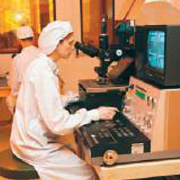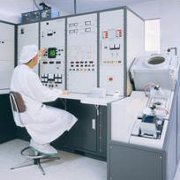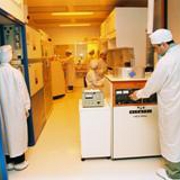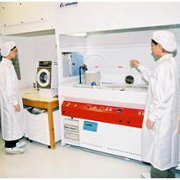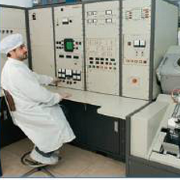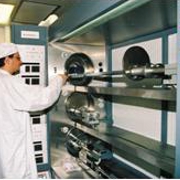| IMEL (Institute of Microelectronics) was established in 1986 as one of the eight Research Institutes of NCSR (National Center for Scientific Research) “Demokritos”, a medium size, multidisciplinary Research Center under the General Secretariat for Research and Technology of the Ministry of Development. Today it is the National Center of Excellence in Micro- and Nanofabrication, Nanoelectronics and MEMs. IMEL has developed experience and expertise, as well as unique technological advantages, which place it among the main EU Research Institutes in the field of Silicon technologies. The strong advantages of IMEL are as follows:
Research at IMEL is carried out at the EU level through its participation in European research projects, networks of excellence and technology platforms. EU projects cover a number of specific priorities of the EU Research Framework Programme, including mainly Information and Communication Technologies (ICT), Nanotechnology, Materials and Production Processes (NMP), Energy, Health and Environment. IMEL’s success in the above peer reviewed R&D funded programmes represents one of the strongest endorsements of IMEL’s R&D competence and reflects the world-class standing of the Institute. On the national level the expertise and infrastructure of IMEL are unique in Greece, which makes its role also unique in developing novel technologies, in transferring technology and know-how to the industry and in developing human potential through education and training activities. Furthermore, IMEL has developed mechanisms to promote the field at the national level through the establishment and coordination of thematic networks and scientific societies (MMN Network, Micro & Nano scientific society). IMEL is a member of the European Academic and Scientific Association for Nanoelectronics (AENEAS-technology platform ENIAC) that aims at promoting scientific collaborations with industry and providing skills and expertise for the execution of common projects, studies, as well as education and training in Nanoelectronics. IMEL it is also a founding member of SINANO, the European Institute of Nanoelectronics and member of the Hellenic Semiconductor Industry Association. The year 2010 we have started the realization of the Micro and Nanosystems Center of Excellence project funded through the Regional Potential Programme of EU. The project will enhance the equipment infrastructure of the Institute as well as its international relationships. As part of the project, a 100 kEV e-beam lithography system with resolution down to 8nm has been selected and put in manufacturing. The system is expected to be delivered and installed in 2011. IMEL will have thus the opportunity to extend its activities well into the nanoscale regime that will impact most of IMEL’s research projects during the coming years. We also mention the organization in 2010 of one international Conference (Microelectronics, Microsystems and Nanotechnology) by IMEL scientists gathering over 150 participants.
The main objectives of IMEL are as follows:
The objectives of IMEL are in line with the government policy to promote excellence in research, high technology development and innovation at Research Institutes and to promote collaboration between academia and industry. In this direction, IMEL has been accredited to international quality and metrology standards (ISO 9001 and ISO/IEC 17025). Due to the infrastructure available at IMEL for silicon processing and micro- nanofabrication, electronics and sensors, and the existing expertise and know-how developed, the role of the Institute is significant in contributing to the increase of the technological level of the country and to spread the knowledge through collaboration with Academia in research and education activities. |
|
About IMEL
|







